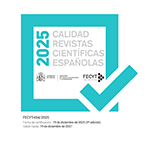Las relaciones interpersonales en Sergeant Rutledge (El Sargento Negro), de John Ford: una visión platónico-aristotélica
Abstract
The author of this article wishes to celebrate the 50th anniversary of the première of Sergeant Rutledge, showing how interpersonal relationships are developed in this film. He studies the ontology and gnoseology of the film, to understand how John Ford is a real classical poet from the perspective of Plato and Aristotle. The film is also a true philosophical myth, which builds and transmits the so-called Poetics of Aristote (1451b), “the Universal”. This work of Ford is essential as a vehicle of an anti-racist and integrating view of Afro-americans in USA, in the context of the civil rights’ figths of 50’ and 60’ decades of XX. century.Ce travail veut célébrer le cinquante anniversaire de l’étrenne du filme Sergeant Rutledge. En étudiant l’ontologie et l’epistemologíe du film, nous arrivons a comprendre pourquoi John Ford est un poète authentique classique selon la perspective de Platon et d’Aristote. De plus, le film est un vrai mythe philosophique, constructeur de cela qu’Aristote appelle dans la Poétique (1451b) l’ “universel”. De la même manière, cette oeuvre de Ford est cruciale comme véhicule d’une thèse antiraciste et intégrative des Afro-Américains dans le cadre de leurs luttes pour les droits civiques aux États-Unis dans les années cinquante et soixante du XXe siècle.
Downloads
Article download
License
In order to support the global exchange of knowledge, the journal CIC. Cuadernos de Información y Comunicación is allowing unrestricted access to its content as from its publication in this electronic edition, and as such it is an open-access journal. The originals published in this journal are the property of the Complutense University of Madrid and any reproduction thereof in full or in part must cite the source. All content is distributed under a Creative Commons Attribution 4.0 use and distribution licence (CC BY 4.0). This circumstance must be expressly stated in these terms where necessary. You can view the summary and the complete legal text of the licence.










